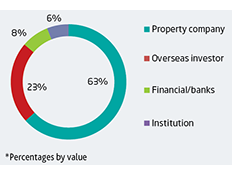We now live in a world where experience is the only thing that trumps efficiency (real life as opposed to the internet). Therefore, experience will be central to the future of physical retail stores and shopping centres.
The essence of experience is what explains why music fans will fill Wembley Stadium to attend a concert where they cannot hear the music well and can barely see the stage. It is why football fans will travel across Europe
to sit in the rain for 90 minutes of excitement in a competition match and why holidaymakers will travel halfway around the world to get to a resort destination.
Great experiences are built around authenticity and yet the very attempt to deliver such authenticity in a standardised manner typically undermines the quality of the experience, leading to such notions as “generic luxury”. To paraphrase Groucho Marx: “Authenticity is the key thing. Once you can fake that then you’ve got it made.”
What are the ingredients that can deliver a store-based retail experience so convincing and satisfying that consumers will elect to shop in person rather than online?
- Obsessive attention to detail;
- A well-selected and trained staff who have a genuine interest in and empathy for others;
- A deep-seated belief that the customer is always right;
- A definition of product and an environment that defy the sterility of commoditised, safe and unoriginal settings;
- A commitment to constant reinvestment in “brand equity”;
- A passion for innovation and reinvention, combined with the necessary tools and culture to achieve these.
If the above strikes you more as a list of the characteristics that one would expect to see when discussing the hotel business, as opposed to shopping centres, that is not by chance. Store-based retail will more and more be built around notions of hospitality.
The dilemma is that while attempting to execute such a strategy is expensive and complicated, the bar keeps rising. The one certain thing we know is that whatever the person shopping in stores finds powerful and
effective this year, it will need to be even better
next year.
It is difficult to give many examples of service and environment that consistently “surprise and delight”, let alone do so in an inspiring way. How do we create a culture in the world of retail property that can achieve such aims? Here are some suggestions:
- Make the dominant feature of your property culture retailer-based, and have other disciplines such as property, finance, security and leasing become service providers for such retail leadership.
- Marry your retail leaders with senior executives from hospitality;
- Be conscious of the difference between fashion-led retail and volume-led retail;
- Employ a flexible lease structure that allows the physical retail environment to be the most up-to-date possible;
- Find a way to inspire your retail occupiers to invest the time and money to make their stores in your shopping centres special and exciting.
A friend of mine describes the greatest competitive threat to his business as his own company executing its tasks in a mediocre fashion. This definition speaks of “clear blue water”, as it describes a culture built on advancing a business and its performance well beyond the practice of preserving the status quo. Such an approach involves, at its heart, true risks.
All this is only possible if one is willing to abandon conventional ideas about organisational structure and culture. One cannot be ordinary in execution, yet achieve exceptional results.
I have yet to mention profitability. Adding value and disrupting the norms open the door to building genuine brand equity, and this is in itself a magical achievement that can then deliver sustainable economic success.
Scott Malkin is chairman of Value Retail




























No comments yet